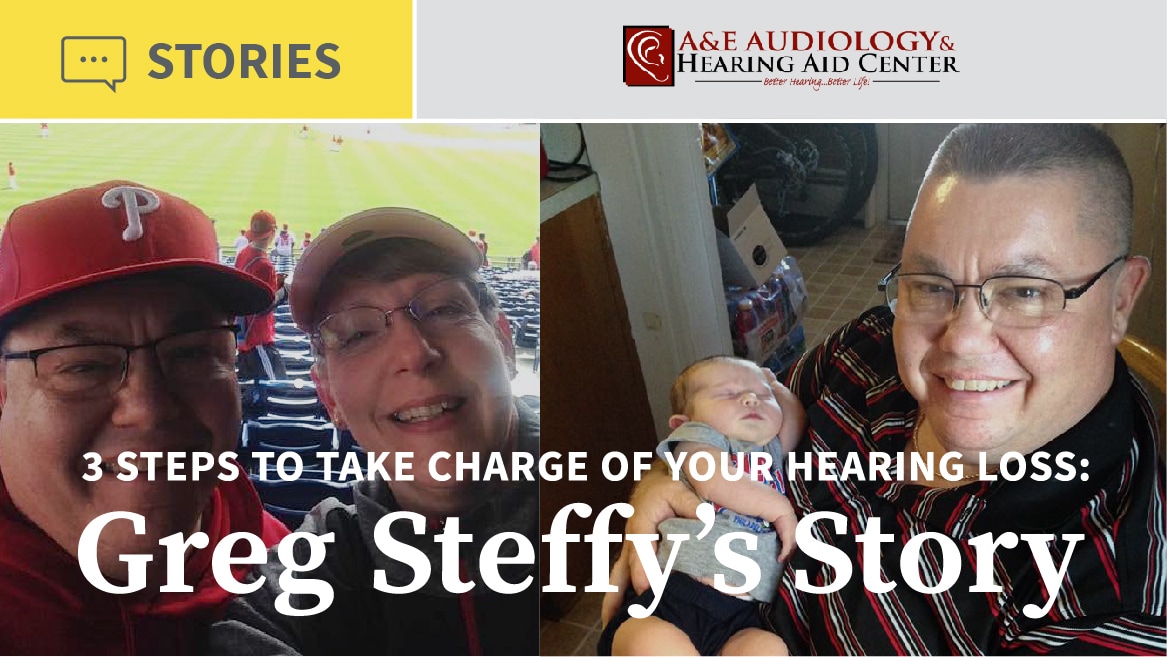3 Steps to Take Charge of Your Hearing Loss: Greg Steffy’s Story
Most of us think that hearing loss won’t happen to us. We think it happens only to the elderly, the people who frequent rock concerts, or those who experienced hearing loss from a young age. We forget that hearing loss can be a gradual occurrence.
For Greg Steffy, hearing loss was happening gradually without realizing it.
“My hearing loss was so gradual that I did not recognize it on my own. It was a problem I didn’t realize I had.” Tweet this
The CDC reported that 15% of adults aged 18 and older had some hearing trouble. Additionally, men aged 20-69 are twice as likely as women to have hearing loss. Greg, although unknown to him, didn’t realize the statistics were stacked against him.
But how do we know that hearing loss is happening to us if we don’t notice it?
1. We need to listen to the people around us who love us. Most often, they are the ones who notice a hearing problem before we know it exists.
Greg says that his wife was instrumental in getting the help that he didn’t know he needed. There would be times when Greg’s back would be turned and his wife would be saying something or trying to ask a question, and he wouldn’t hear her. It was obvious that Greg wasn’t hearing well.
“It took the loving compassion of my wife to reveal my hearing loss,” he says.
What can we do once we know hearing loss could be happening?
2. Make an appointment with a Lancaster audiologist.
A primary care physician can remove ear wax, but they don’t specialize in hearing loss. An audiologist can meet needs that your family doctor cannot.
Greg came to A&E in December 2016. We were very thorough, making sure to use the most up-to-date technology and tests to determine Greg’s level of hearing loss. Not only do we want to restore our patient’s hearing to the best level possible, we also want to restore the quality of life for each person we see.
Our tests concluded that Greg had moderate hearing loss. Hearing aids were the next step, and once fitted, Greg realized he had been missing some very important sounds.
The first time holding his sleeping six month old granddaughter after having hearing aids, Greg recalls hearing all the sweet, small sounds of a baby in slumber. “It was the most emotional moment for me. What precious sounds!”
Because his wife noticed hearing loss and his family doctor recommended A&E, Greg was able to experience his life better than before.
So, how do we maintain great hearing?
3. Follow up with your audiologist and stay aware of your own quality of hearing.
Making sure that your hearing aids are fitted and working properly will do wonders to keep your hearing up to par. If you notice that sounds around you begin to diminish or you find yourself struggling to hear the person across from you, make an effort to see your audiologist.
Your quality of life does not have to diminish because of hearing loss. You can do your part to maintain a healthy life. Tweet this
Greg says that even after his initial appointment, the care from A&E continued: “The follow up visits were filled with care and concern at getting my new devices adjusted perfectly.”
To ensure our patients experience the best hearing possible, we want to perfectly fit your hearing devices to you. That requires intentional care for our patients.
High quality hearing is a possibility for you, too. Be sure you listen to those around you when they recognize a hearing problem you might not know is there. Make an appointment with an audiologist to receive the best care possible, and stay up-to-date on your hearing health.
“You never know what you’re missing out on,” Greg says. He’s right. Your life could be changed just by taking the initiative to care for your hearing.
Give us a call. We’d love to be the ones to help you take charge of your hearing loss.


















